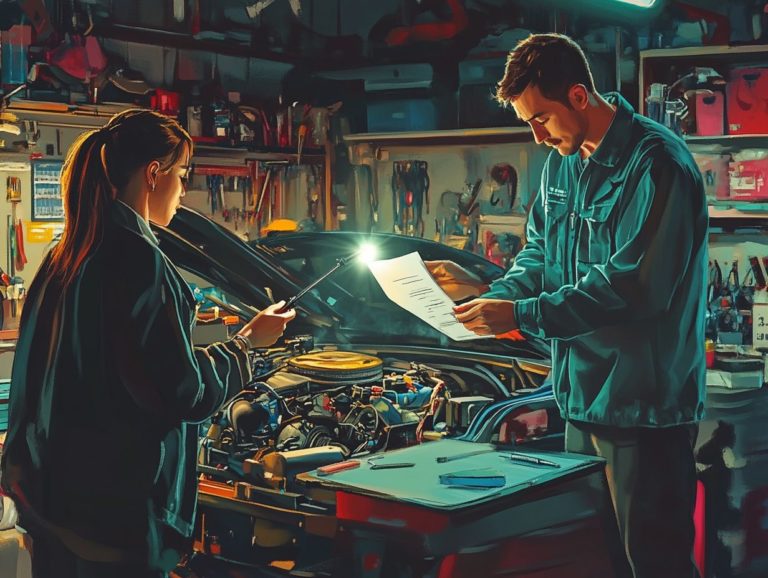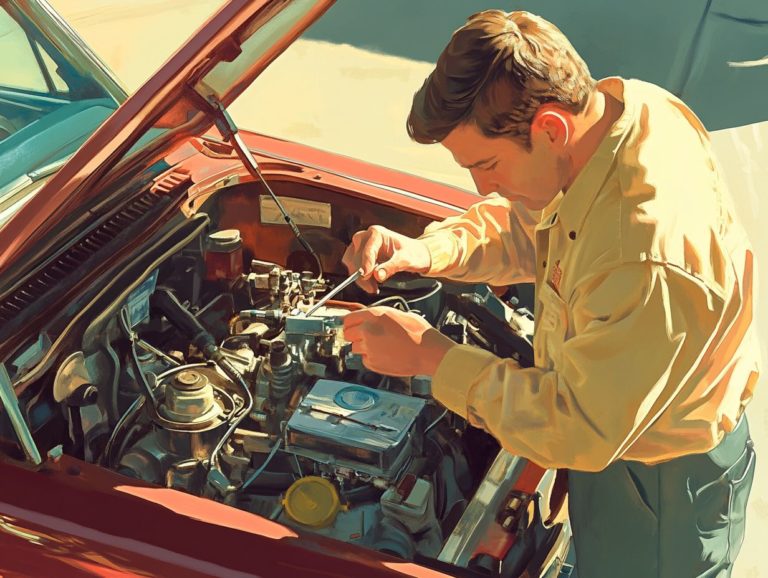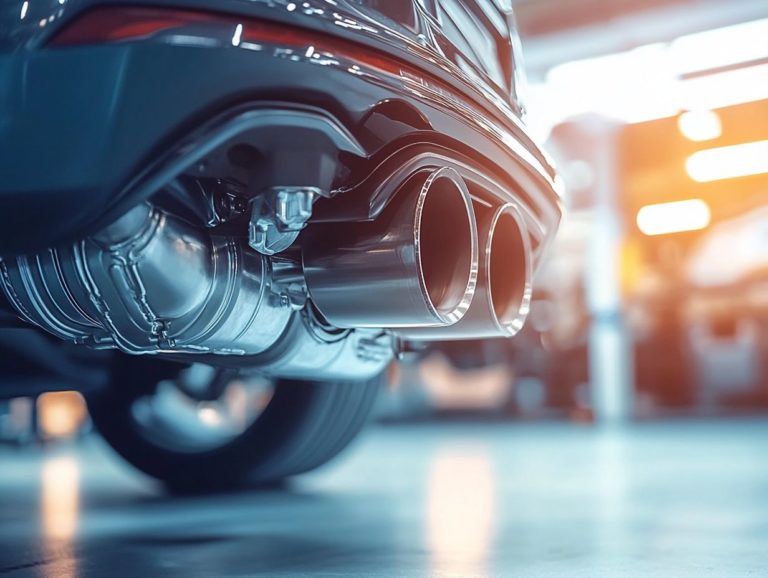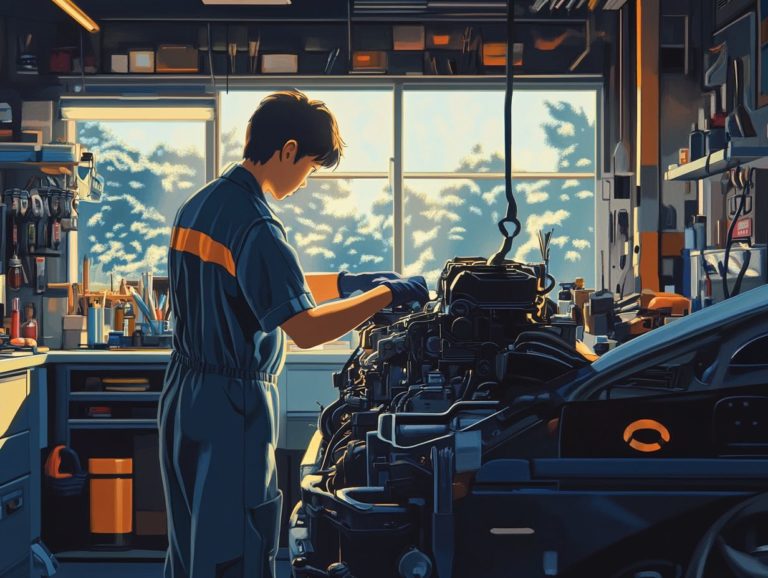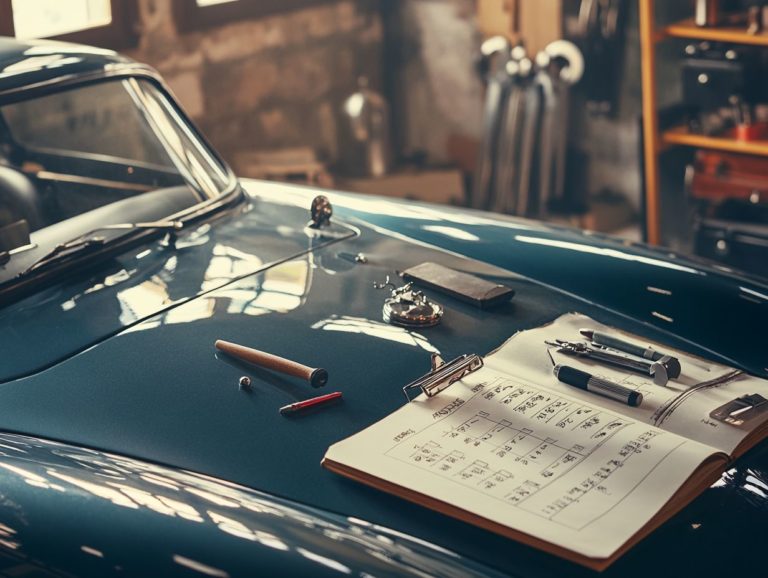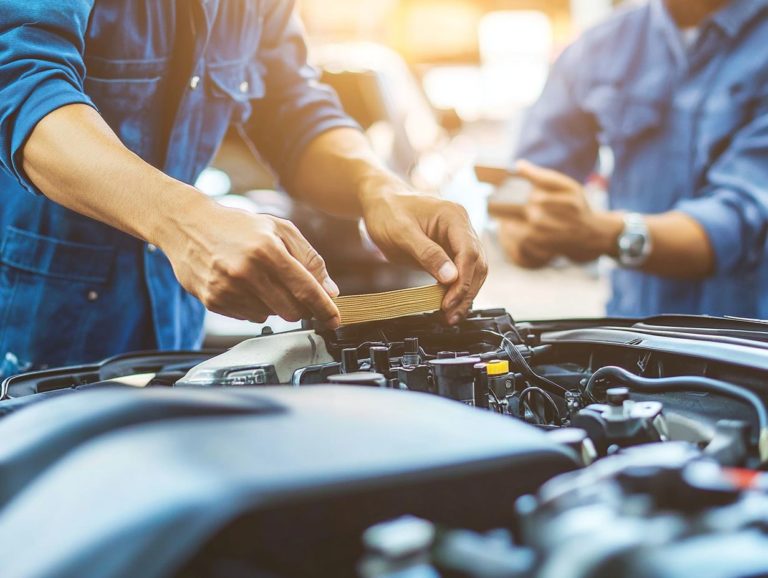The Impact of a Poor Inspection on Car Value
When maintaining your vehicle, understanding car inspections is paramount. A thorough inspection guarantees your car s safety and plays a significant role in its resale value.
This guide delves into the essentials of car inspections, highlighting what a proper check involves and potential red flags to watch for. It examines how a lackluster inspection can lead to diminished value and safety hazards while offering tips to ensure you receive the high-quality inspection your vehicle deserves.
Whether you re a seasoned car owner or navigating vehicle ownership for the first time, this information is invaluable for protecting your investment.
Contents
- Key Takeaways:
- Understanding Car Inspections
- The Importance of a Thorough Inspection
- Signs of a Poor Inspection
- How a Poor Inspection Can Affect Car Value
- Avoiding a Poor Inspection
- Frequently Asked Questions
- What is a poor inspection and how does it impact car value?
- Will a poor inspection lower my car’s resale value?
- What are the most common issues found in a poor inspection?
- Can a poor inspection be avoided?
- Is it worth fixing the issues found in a poor inspection?
- How can I increase the value of my car after a poor inspection?
Key Takeaways:
- A poor car inspection can significantly decrease the resale value of your car.
- Thorough inspections avoid potential safety risks and preserve value.
- Investing time in a quality inspection can prevent future problems.
Understanding Car Inspections
Understanding car inspections is essential for anyone selling or buying in the used car market. These evaluations are key in determining a vehicle’s resale value and overall condition.
A meticulous vehicle inspection uncovers potential problems with how the car operates and reveals the car s maintenance history, which greatly impacts buyer confidence.
Services like Autozen provide comprehensive inspection reports, covering everything from past accidents and damage to minor cosmetic imperfections. This transparency reassures buyers and enhances the vehicle s market appeal.
What is a Car Inspection?
A car inspection is a thorough evaluation of your vehicle’s condition, typically conducted by a qualified mechanic, ensuring that your car remains safe and functional on the road.
This assessment checks crucial elements, such as brakes for stopping power and the suspension system that affects ride quality and handling.
Your mechanic will also examine the transmission to ensure smooth gear shifting, which is essential for performance. The emissions system is reviewed to ensure compliance with environmental regulations and reflects your vehicle’s impact on air quality.
By examining lights, tires, and fluid levels, the inspection report provides a complete overview of your vehicle’s health.
It identifies any potential issues that could pose safety risks or lead to costly repairs, allowing you to address them proactively.
The Importance of a Thorough Inspection
Conducting a thorough inspection is crucial for anyone considering the purchase or sale of a car. This practice safeguards your investment, builds buyer confidence, and helps secure a favorable resale value.
A comprehensive vehicle inspection reveals hidden mechanical issues that might deter potential buyers, especially in a competitive market where transparency is vital. By ensuring vehicles are in top condition and ready for resale, you foster trust and facilitate smoother transactions for both sellers and buyers.
Why a Poor Inspection Can Affect Car Value
A poor inspection can significantly impact your car’s resale value, revealing major mechanical issues that compromise its condition and safety.
When potential buyers hear about outdated technology or spot signs of poor maintenance and past accidents, their interest diminishes. This decrease in desirability typically leads to reduced marketability, as buyers become wary of a car that hasn’t passed inspection standards.
Flagging crucial systems like brakes or the engine for repairs raises doubts about the vehicle’s overall care. Consequently, a negative inspection outcome can result in offers that fall far short of your expectations.
Signs of a Poor Inspection
Recognizing the signs of a poor inspection is essential for both buyers and sellers. These red flags can uncover issues that compromise a car’s value and safety.
Look for common indicators of a subpar inspection, such as:
- An unclear maintenance history.
- Signs of previous accidents or damage.
- Excessive mileage.
- Cosmetic flaws that hint at neglect or inadequate care.
By being vigilant about these signs, you empower yourself to make informed decisions and avoid costly misunderstandings in the future.
In conclusion, understanding the importance of thorough car inspections can help you protect your investment and ensure safety on the road. Don t wait; prioritize getting your vehicle inspected today!
Red Flags to Look Out For
When you conduct a vehicle inspection, watch for several red flags that may signal serious mechanical issues or hidden problems. Unusual engine noises like knocking can indicate serious damage. Rust or leaks under the car may mean poor maintenance, which can affect the vehicle’s longevity and safety.
Cosmetic issues such as dents or scratches detract from the car’s appearance and may conceal deeper structural issues. Old technology can also be a problem, such as outdated systems that play music and provide navigation or a lack of modern safety features that negatively impact your driving experience and overall performance.
Evaluate these elements carefully to avoid costly surprises later!
How a Poor Inspection Can Affect Car Value
A poor inspection lowers your car’s resale value. It raises concerns for buyers who want a reliable vehicle. Investing in a thorough inspection ensures that you present your car in the best light, maximizing its appeal to prospective buyers.
Decrease in Resale Value
One of the most immediate consequences of a poor inspection is a decline in resale value, which can undermine your investment protection as a seller. Buyers often see inspection reports as an insight into the overall condition of the vehicle, and any red flags can raise doubts about its worth.
Common issues revealed during inspections like roof damage, plumbing leaks, or outdated electrical systems can raise alarms and suggest hidden costs. Potential buyers may worry about inheriting major repairs, leading them to propose lower offers or possibly walk away altogether. This perception can skew the vehicle’s marketability, ultimately reducing its appeal in the resale market.
Potential Safety Risks
Inadequate vehicle inspections can lead to accidents. Undiscovered issues may cause brakes or lights to fail when you need them most, endangering your safety and that of other road users. The lack of advanced safety features, such as automatic emergency braking and lane-keeping assist, heightens these risks, especially in older vehicles without modern technology.
By addressing mechanical concerns through comprehensive inspections, you can significantly enhance road safety, preventing catastrophic incidents and ensuring peace of mind for everyone who shares the road.
Avoiding a Poor Inspection
Avoid poor inspections to protect your vehicle’s value and safety. By implementing proactive strategies, you can enhance the quality of the inspection process. This means maintaining a meticulous maintenance history and conducting regular check-ups to catch potential issues before they escalate.
By adhering to the right guidelines, you attract buyers with confidence and transparency, empowering yourself to make informed decisions in the used car market.
Tips for Ensuring a Thorough Inspection
To ensure a thorough inspection, follow specific tips that help identify potential issues before they escalate, safeguarding your vehicle’s condition and value. Choose a reputable mechanic for a detailed inspection. Their expertise guarantees a thorough examination and provides insights into common problems for your vehicle’s make and model.
Requesting an inspection report gives you a documented assessment of your vehicle’s overall health an invaluable resource for future reference. By maintaining an accurate maintenance history, you can pinpoint recurring problems and make informed decisions regarding repairs and upkeep, ultimately preserving your vehicle’s longevity and resale value.
The Importance of a Quality Inspection for Car Value
A quality inspection is crucial for boosting your car’s value. It directly impacts buyer confidence and can lead to a higher resale price.
When potential buyers see that your vehicle has undergone a thorough quality inspection, their perception changes significantly. This not only eases their concerns about hidden flaws but also reinforces the car s reliability and overall condition.
A well-documented inspection report is a powerful asset that establishes transparency. It allows you to showcase the vehicle’s strengths and true value.
As a result, informed buyers are more likely to make better offers. This speeds up the sales process and increases satisfaction for everyone involved.
Prioritizing quality inspections can boost your car’s value and attract eager buyers!
Frequently Asked Questions
What is a poor inspection and how does it impact car value?
A poor inspection identifies significant issues with a vehicle, ranging from engine problems to cosmetic damage. It can greatly decrease the car’s worth.
Will a poor inspection lower my car’s resale value?
Yes, a poor inspection can lower your car’s resale value. Buyers may hesitate to pay the asking price if they see issues or defects, leading to lower offers.
What are the most common issues found in a poor inspection?
The most common issues include engine problems, transmission issues, brake failures, electrical malfunctions, and body damage. These can severely impact the car’s value.
Can a poor inspection be avoided?
You can avoid a poor inspection by properly maintaining and servicing your car. Regular oil changes, tune-ups, and addressing warning signs can help. However, some problems may arise unexpectedly.
Is it worth fixing the issues found in a poor inspection?
It depends on the issues’ severity and repair costs. In some cases, fixing the problems may help maintain the car’s value. However, if repairs are extensive, consider selling the car as-is to avoid costly repairs!
How can I increase the value of my car after a poor inspection?
If your car has a poor inspection report, you can increase its value by repairing major issues. Providing documentation of regular maintenance and addressing cosmetic damage can also help. A re-inspection can show that the issues have been resolved.

